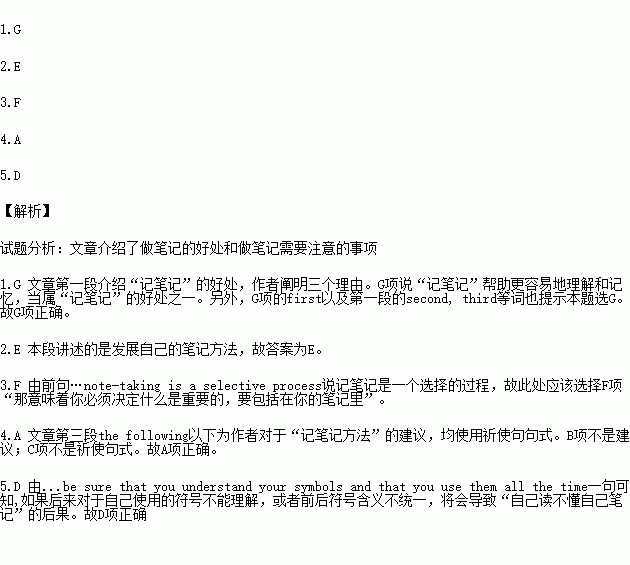题目内容
根据短文内容,从短文后的选项中选出能填入空白处的最佳选项。选项中有两项为多余选项。
Taking good notes is a time-saving skill that will help you to become a better student in several ways. 1. Second, your notes are excellent materials to refer to when you are studying for a test. Third, note-taking offers variety to your study time and helps you to hold your interest.
You will want to take notes during classroom discussions and while reading a textbook or doing research for a report. 2. Whenever or however you take notes, keep in mind that note-taking is a selective(选择的) process. 3.
The following methods may work best for you.
·Read the text quickly to find the main facts and ideas in it.
·Carefully read the text and watch for words that can show main points and supporting facts.
·Write your notes in your own words.
· 4.
·Note any questions or ideas you may have about what was said or written.
As you take notes, you may want to use your own shorthand (速记). When you do, be sure that you understand your symbols(符号,记号) and that you use them all the time. 5.
A. Use words, not complete sentences.
B. There are three practical note-taking methods.
C. You must write your notes on separate paper.
D. Otherwise(否则), you may not be able to read your notes later.
E. You will also want to develop your own method for taking notes.
F. That means you must first decide what is important enough to include in your notes.
G. First, the simple act of writing something down makes it easier for you to understand and remember it.
假设你是李华,今年将要参加高考。你想在大学里学习外语专业,但是你的老师和父母都对你的选择提出了异议,对此你很苦恼。请你根据下表提示,用英语给你的英国笔友David发一封邮件,谈谈关于你的专业选择问题,并寻求帮助。
建议 | 专业 | 理由 |
父母的建议 | 金融 | 将来从商,为在商界工作做准备 |
老师的建议 | 法律 | 就业前景好 |
你的想法 | 外语 | 充分发挥自己的语言天赋 |
注意:
1. 词数100左右; 2. 可适当增加细节,以使行文连贯;
3. 信的开头和结尾已给出,但不计入总词数。
Dear David,
I am at a loss nowadays.
I’m looking forward to your early reply.
Yours,
Li Hua


 The bus we __________ (一直等待) was too crowded, so we decided to catch a later one.
The bus we __________ (一直等待) was too crowded, so we decided to catch a later one.